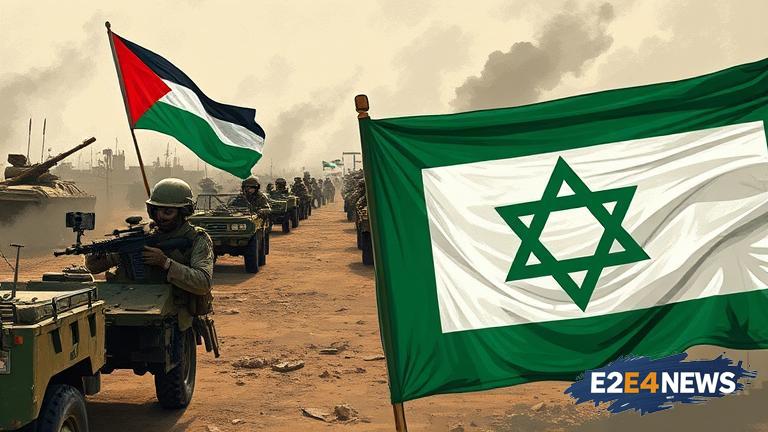The ongoing conflict between Israel and Hamas has sparked a heated debate about whether the violence constitutes genocide. The term genocide refers to the intentional destruction of a national, ethnic, racial, or religious group, and its classification is a highly sensitive and complex issue. The Israeli-Palestinian conflict has been marked by periods of intense violence, including the recent war between Israel and Hamas, which has resulted in significant loss of life and displacement of people. The question of whether this violence constitutes genocide is a matter of intense debate, with some arguing that it meets the definition of genocide, while others disagree. The United Nations defines genocide as acts committed with the intent to destroy, in whole or in part, a national, ethnic, racial, or religious group, including killing members of the group, causing serious bodily or mental harm, deliberately inflicting conditions of life calculated to bring about the group’s physical destruction, imposing measures intended to prevent births within the group, and forcibly transferring children of the group to another group. The classification of genocide is typically determined by international courts and tribunals, such as the International Court of Justice and the International Criminal Court. However, the process of determining genocide can be complex and time-consuming, and it often requires careful consideration of the evidence and the specific circumstances of the conflict. In the case of the Israel-Hamas war, the classification of genocide is further complicated by the fact that both sides have committed acts of violence, and it is difficult to determine the intent behind these acts. Some argue that the Israeli military’s actions, including the use of force in densely populated areas and the blockade of Gaza, constitute genocide, while others argue that these actions are legitimate measures to protect Israeli citizens from terrorist attacks. On the other hand, some argue that Hamas’s actions, including the launching of rockets into Israeli territory and the use of human shields, also constitute genocide. The debate over the classification of genocide in the Israel-Hamas war is not only a matter of legal interpretation but also a highly politicized issue, with different countries and organizations taking differing positions. The United States, for example, has been accused of blocking UN efforts to investigate alleged war crimes in Gaza, while other countries, such as Turkey and Iran, have been vocal in their condemnation of Israel’s actions as genocide. The European Union has also been criticized for its failure to take a strong stance on the issue, with some arguing that its inaction has emboldened Israel to continue its actions. The classification of genocide in the Israel-Hamas war has significant implications, not only for the parties involved but also for the international community. If the violence is classified as genocide, it could lead to increased pressure on Israel to change its policies and to provide greater protection for Palestinian civilians. It could also lead to increased international scrutiny of Hamas’s actions and greater pressure on the organization to cease its violent activities. However, the classification of genocide is a complex and sensitive issue, and it requires careful consideration of the evidence and the specific circumstances of the conflict. Ultimately, the classification of genocide in the Israel-Hamas war will depend on the findings of international courts and tribunals, as well as the positions taken by countries and organizations around the world. The debate over the classification of genocide in the Israel-Hamas war is a highly polarized and contentious issue, with differing opinions and perspectives from around the world. As the conflict continues, it is likely that the debate will only intensify, with significant implications for the parties involved and the international community. The international community must carefully consider the evidence and the specific circumstances of the conflict, and work towards a resolution that protects the rights and dignity of all individuals involved. The classification of genocide is a serious issue that requires careful consideration and thoughtful debate, and it is essential that all parties approach the issue with sensitivity and respect for the victims of the conflict. The Israel-Hamas war is a complex and multifaceted conflict, and the classification of genocide is only one aspect of the broader debate about the conflict. The international community must work towards a comprehensive resolution that addresses the root causes of the conflict and provides a lasting solution to the violence. The classification of genocide in the Israel-Hamas war is a critical issue that requires careful consideration and thoughtful debate, and it is essential that all parties approach the issue with sensitivity and respect for the victims of the conflict. The debate over the classification of genocide in the Israel-Hamas war is a highly polarized and contentious issue, with differing opinions and perspectives from around the world. As the conflict continues, it is likely that the debate will only intensify, with significant implications for the parties involved and the international community.
